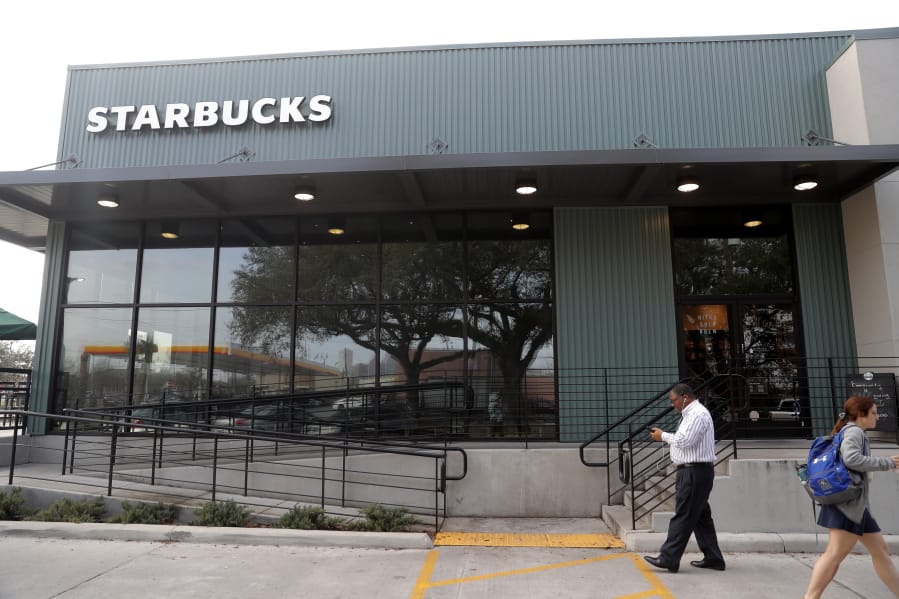SEATTLE – After allegations of racial bias in its promotions, Starbucks said Wednesday it reached a voluntary agreement with the Equal Employment Opportunity Commission to resolve the allegations and would change its promotion practices.
According to a report completed for Starbucks by the law firm Covington & Burling, “the EEOC’s allegations were based primarily on workforce data from 2007 through 2011 that, according to the EEOC, showed minority retail partners in the United States received fewer promotions than statistically expected.”
The firm said Starbucks’ own analysis of its data “did not reveal systemic racial discrimination in promotions.” Covington & Burling did not independently investigate the allegations, the report said.
In a letter to employees Wednesday, CEO Kevin Johnson said Starbucks reached the agreement with the EEOC “through a voluntary process earlier this year.” Johnson said the company does not know what prompted the allegations.
The report Starbucks released Wednesday is its third since Starbucks first commissioned a “civil rights assessment” after a store manager in Philadelphia called the police on two Black men and video of their arrest went viral in 2018.
Last summer, amid global protests in the wake of the police killing of George Floyd in Minneapolis, Starbucks faced more backlash after barring employees from wearing Black Lives Matter symbols at work. The company later backtracked on the policy and said employees could wear some Black Lives Matter symbols until they received company-designed T-shirts that featured a handful of illustrated signs with messages like “unity!” and “justice!” One of the signs in the illustration said, “Black Lives Matter.”
In October, the Seattle-based coffee chain said it would tie executive pay to targets of racial diversity among its workforce and released statistics about diversity among its workforce. The company recently named investor Mellody Hobson as its board chair, making her the only Black woman to chair an S&P 500 company.
Starbucks’ corporate workforce is less racially diverse than staff at its retail locations. Among retail employees, about 8% are Black, 5% are Asian and about 27.5% are Hispanic or Latino, according to company data. Among corporate employees, about 4% are Black, 7% are Hispanic or Latino and 19% are Asian.
According to the Covington & Burling report, retail store managers “will no longer be able to execute on promotions outside of an established hiring and promotion process” and only candidates who apply through that process will be considered for open positions.
Starbucks plans to roll out a tracking system for retail job postings and promotion opportunities and has hired an independent labor economist to assess its progress, according to the report. The company plans to put in place new training and interview guides to “empower store managers to make merit-based and equitable hiring decisions that are based on the requirements of the job,” the report said.
“The agreement is not only the right thing for partners, it has also led us to focus more resources on structural changes necessary to support partners’ career progressions and ensure that every partner has the opportunity to learn about promotion opportunities,” Johnson wrote.
University of Washington professor Marieka Klawitter, a labor economist who has studied employment discrimination, said informal promotion processes are a common source of implicit bias in the workplace.
“We like people who are like us, generally. That goes along race and gender lines, national origin, immigration status – people who sound like us and think like us,” Klawitter said. “So if I’m a manager looking around for who I think is going to be great to promote, I’m pretty likely going to promote people who look like me, sound like me and act like me.”
Formalized processes can begin to guard against those biases, Klawitter said. Some employers have anonymized their hiring processes to avoid learning names, gender, race and other factors until later in the interview process.
Johnson’s letter said employees would learn about the new practices in upcoming conversations with managers.
Whether companywide efforts like this work depends on follow-through, Klawitter said.
“It’s easy to have a big plan and to have a lot of celebration of ‘we’re making change’ and then for it to fall off the agenda. … Any kind of major organizational change effort has to have follow-up,” she said.



